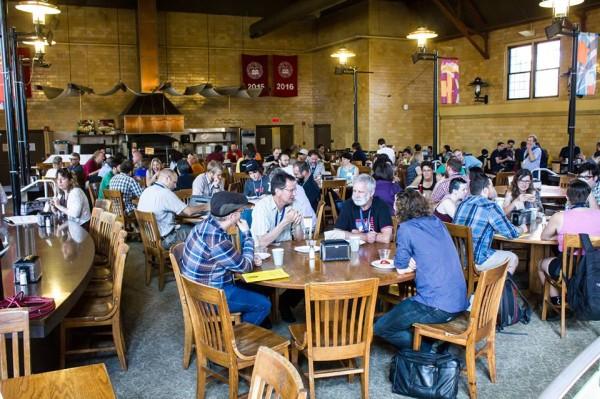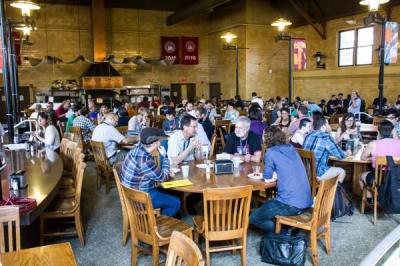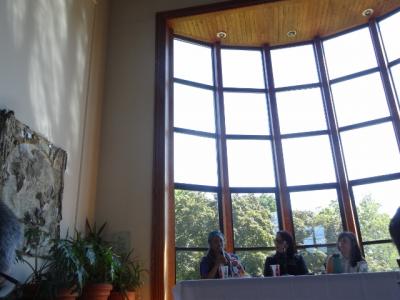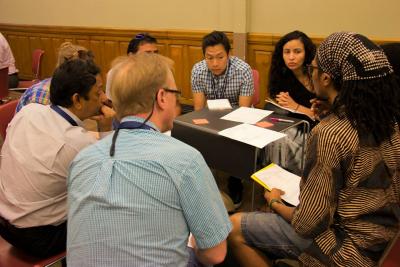
Eastern Worker Co-op Conference Sees Its Largest Ever Gathering in Worcester
 A “record” number of worker cooperators and other participants in democratic employee-owned businesses attended The Eastern Conference for Workplace Democracy July 10-12 Worcester, MA, 50 miles southwest of Boston and home to several youth-led worker cooperatives and a local solidarity economy movement. Over three hundred people converged on the Clark University campus where the conference took place to hone their knowledge and skills, network and connect with each other, and to celebrate a new level of cooperative growth and social and political possibilities.
A “record” number of worker cooperators and other participants in democratic employee-owned businesses attended The Eastern Conference for Workplace Democracy July 10-12 Worcester, MA, 50 miles southwest of Boston and home to several youth-led worker cooperatives and a local solidarity economy movement. Over three hundred people converged on the Clark University campus where the conference took place to hone their knowledge and skills, network and connect with each other, and to celebrate a new level of cooperative growth and social and political possibilities.
Conference organizer Neily Jennings said that participants – 60 more than expected – came from as far away as Bangladesh, South Africa, and Puerto Rico, and U.S. urban areas like Philadelphia; Washington, DC; Detroit; Chicago; Baltimore; Boston; Providence, RI; Cincinnati; Austin; Minneapolis; and more rural or small-town representation Maine, Vermont, Wisconsin, New Hampshire, Connecticut, Ohio, North Carolina, Virginia, New York state, Tennessee, and Arkansas.
 A significant number of participants came from Worcester, New York City, and the Pioneer Valley of Massachusetts, home of the Valley Alliance of Worker Cooperatives.
A significant number of participants came from Worcester, New York City, and the Pioneer Valley of Massachusetts, home of the Valley Alliance of Worker Cooperatives.
“It’s clear that the economic, political, and social landscape that we occupy is ripe for the formation and expansion of all kinds of democratic enterprises,” Jennings told GEO after the conference.
The theme of the conference was “Connecting for Impact.” The bilingual program booklet elaborated:
From New York City to Madison, Wisconsin and beyond, worker cooperatives are allying with social services agencies, social justice movements, and unions to focus the attention of politicians on the power of worker ownership to anchor wealth and create good jobs. Cooperatives like CERO and Real Pickles are connecting with local investors in new ways, creating businesses with enough capital to compete and grow in competitive marketplaces. Cooperative Developers have sought out new allies and models as well; The Cooperative Development Institutes’ adoption of the ROC model of cooperative housing conversions for worker cooperatives yielded the largest worker cooperative conversion yet in the United States, and the Democracy at Work Institute is launching the Cooperative Conversions Collaborative to help seize the opportunity presented by retiring baby boomers.
Together these alliances and many more are proving that worker owned businesses are an important part of any attempt at economic development that seeks to put the community and workers first.
The opening plenary, Building Bridges: Stories from Quebec, Appalachia, Puerto Rico and New York City, on Saturday explored national and international connections and featured the following:
Elandria Williams, of the Highlander Research and Education Center and the Southern Grassroots Economies Project, who spoke on her work in Appalachia and a recent trip to the Emila Romagna region of Italy to learn more about cooperatives to bring to her work in the South. There the co-ops have many streams of income and have government support. “The reason why [Italian]co-ops are strong is because they are radical economy and they are doing it for humanity,” she said. “Their very essence… is life-changing…The lesson I learned in Italy is to take over this whole thing.” She also asked participants to “please get involved in justice organizing in your community.”
Vanessa Bransburg, of the Center for Family Life in Brooklyn, New York City, who spoke about the Center’s work developing worker cooperatives as a means to provide jobs for immigrant women. Bransburg said the group also addressed domestic abuse, childcare, and crisis intervention. She said their approach to addressing family issues allowed members “to be present in the co-op.” CFL is working on its seventh co-op, Sunset Scholars, to provide tutoring in the Sunset Park neighborhood in Brooklyn. The social service agency has also helped to organize Cooperatives United for Sunset Park, a peer-learning network that enables the co-ops to participate in group purchasing, money-lending and other support. The group is working on offering health insurance for its members.
Lymarie Nieves Plaza, Cooperativa de Ahorro y Credito Candel Co-op, who told the story about how the world’s first cooperative composed entirely of inmates got started. [we'll have that story later this week -ed.]
Jessica Gordon Nembhard, author of the book Collective Courage: A History of African American Economic Thought and Practice, who moderated the panel.
Nancy Neamtan, Quebec Social Economy Network, who was scheduled to speak about efforts on democratizing the economy on multiples levels of government and society, was unable to attend.
“One of the important things about co-ops is connection to community, and the way the rest of the Solidarity Economy connects to co-ops,” Gordon Nembhard said.
The conference program boasted of more practical workshops, stating “more than half our content specifically focuses on running a successful democratic business.”
Along with basic information on understanding finances, developing leaders, education, training and customer service, workshops included:
 Cottage Industries: Live/Work Cooperatives,
Cottage Industries: Live/Work Cooperatives,
How the U.S. Solar Industry formed a Nationwide Purchasing Cooperative,
Toward Democratic Franchise Systems? Tools for Accelerating the Success of Cleaning and other Service Industry Co-ops,
6th Principle Cooperation Among Co-ops: Cross Sector Collaboration and Secondary Co-ops
Cooperative Ownership and the Prison Industrial Complex: A Case Study from Puerto Rico.
A Saturday night barbecue at the Woo on Main Street in Worcester featuring movement singer Taina Asili and La Bande de Rebelde (The Rebel Band), and 4Elements, a youth movement that uses hip hop music for social justice. In the spirit of the conference theme of Connecting for Impact, the two bands performed separately, and then collaborated on a couple of songs that kept conference goers dancing and invigorated.
Cooperators learned and studied hard, but then they played hard too as they watched stunning breakdancing, listened to multicultural liberation music, and danced in a cooperative frenzy.
Go to the GEO front page
Citations
Ajowa Nzinga Ifateyo (2015). Connecting for Impact : Eastern Worker Co-op Conference Sees Its Largest Ever Gathering in Worcester. Grassroots Economic Organizing (GEO). https://geo.coop/story/connecting-impact

Add new comment